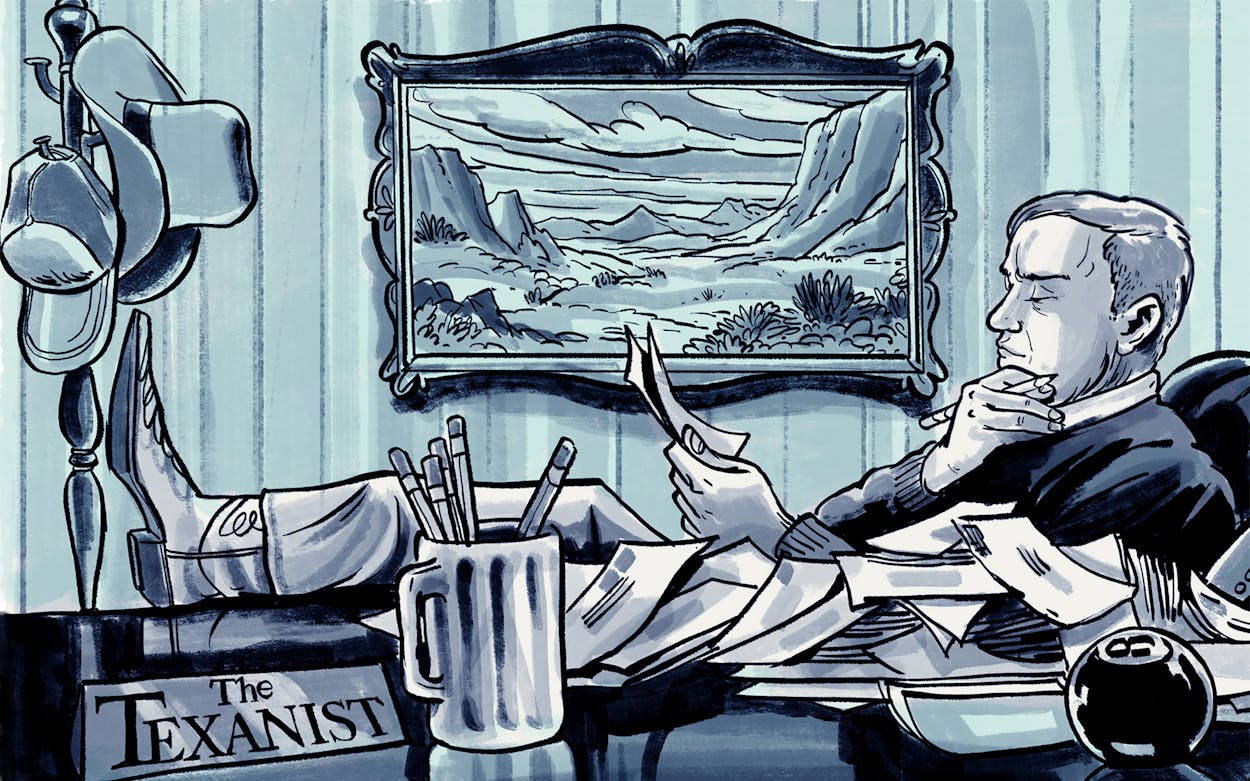Q: My wife is a third or fourth generation Texan on her dad’s side and fifth on her mother’s. She has ancestors buried in the State Cemetery. Her grandpa’s nickname in the Army was “Tex,” for crying out loud. But here’s the rub—her dad was career Army and she was born when he was stationed at the Presidio in (shudder) California. Where do you come down on the issue of her entitlement to native Texan status? She thinks no, but I think yes.
EAF, Austin
A: Here is a version of the question that lands in the Texanist’s mailbox more often than any other: “Am I (or is someone else that I know) a Texan?” The particular circumstances vary wildly; some cases are cut-and-dried, some contain quite a bit more nuance. At the core of each of these queries, though, is a strong yearning to be dubbed Texan. The inquiry at hand is interesting. On the one hand there’s the impressive pedigree; on the other, the fact that this appeal is being made on behalf of a confessed native Californian, which, the Texanist is both sorry and surprised to have to report, fairly well precludes a Texas nativity. The missus is right and you are, unfortunately, not right. You see, it is impossible for one to be both a native Californian and a native Texan. Even the old “bag of Texas soil in the delivery room” trick is ineffectual in this scenario. Thanks for the letter and good luck.
Wait, wait. Even though this may be the end of the direct response to your question, let’s not let this be the end of the story. As a sort of consolation prize, please bear with the Texanist as he expands a bit.
Your wife’s origin story brought to mind the 2016 Republican party presidential primaries, which, if you recall, involved ad nauseam back-and-forths by the political punditry on the topic of Senator Ted Cruz’s eligibility to hold the office of the presidency. Cruz, it was argued by some, was not qualified because he was born in Canada.
Section 1 of Article II of the U.S. Constitution says that “No Person except a natural born Citizen, or a Citizen of the United States, at the time of the Adoption of this Constitution, shall be eligible to the Office of President.” It then goes on to say that the minimum age requirement is thirty-five years and that the person must have been a resident within the United States for fourteen years.
It turns out, though, that the widely accepted meaning of “natural-born citizen”—which is not expressly defined in the Constitution—is, with a few exceptions, a person born either inside or outside the United States to at least one parent who is a U.S. citizen. Cruz passes that test, as his mother was a U.S. citizen at the time of her son’s birth.
The Texanist figures that if we were to apply the natural-born citizen clause to the question of the Texanness of your California-born spouse, we could eventually agree that as she is the daughter of two native Texans in good standing (and the granddaughter of “Tex”), she is eligible to claim the status of natural-born Texan. (Ted Cruz, on the other hand, can make no such claim, as his mother is a native of Delaware.)
In short, being Texan isn’t as black-and-white as one might think. A person is not merely a Texan or not a Texan. Even among Texans there are varying degrees of Texanness, much as there are varying levels of proficiency in the practice of karate. There are the native-born Texans, like the Texanist. These can be thought of as the black belts. There are the “I wasn’t born in Texas, but I got here as fast as I could” Texans, like George W. Bush and Jerry Jeff Walker. They are the brown belts. There are the honorary Texans, like Darrell Royal and Chuck Norris, both native Okies, who earned their purple belts by way of valorous efforts to improve the Texas brand’s global reach. And there are the mere residents of Texas, who need only show two documents proving at least thirty days of occupancy in order to obtain their white belts from the county clerk. This last category is made up of folks who are Texans in address only—mailbox Texans, as the Texanist refers to them. To that familiar list of Texans-of-all-stripes, the Texanist would now like to add the natural-born Texan, a person who was not born here but was fortunate enough to have been born to at least one person who was. These are either the brown belts or the orange belts, depending on whether or not they’ve ended up back in Texas themselves. Or perhaps they’re just all belts of an ochre shade. The Texanist can’t decide.
In his book Travels with Charley: In Search of America, John Steinbeck famously observed that “Texas is a state of mind.” So, too, it could be argued, is being Texan. While your better half is not by any stretch of the imagination a native Texan, there’s no question that she is more than just a run-of-the-mill resident of the Lone Star State. She is a natural-born Texan. And that has a much better ring to it than first-generation native Californian, don’t you think?
Have a question for the Texanist? He’s always available here. Be sure to tell him where you’re from.
- More About:
- The Texanist
- Ted Cruz
- Austin









